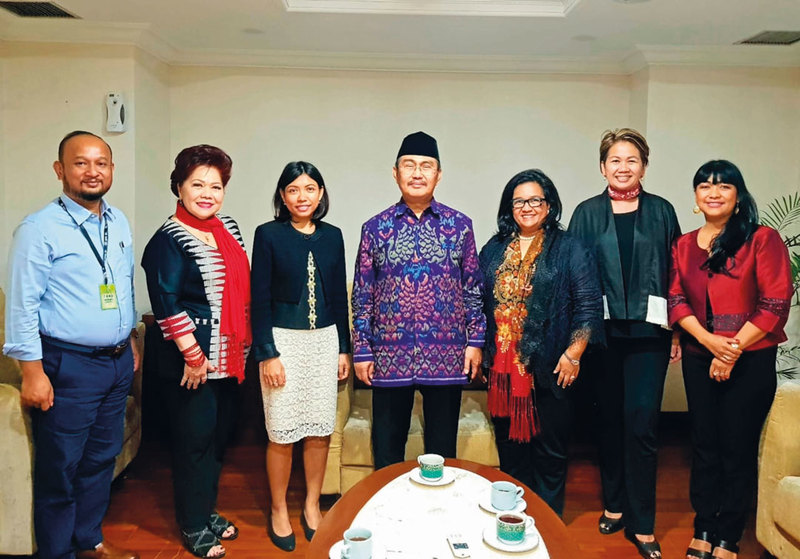
Lovebirds of different colours, race and culture are living proof that love transcends all. But is it always smooth sailing for them?
We never know who our partner in life is. When someone from a thousand miles away, speaking a different language, bearing different skin, eyes, hair colour, manage to find a place in your heart, and if you two decide to tie the knot, then be ready for big challenges.
Being an interracial couple can be difficult at times by virtue of the fact that we have to deal with bias and regulations in day-to-day lives. Ideally, love should have no bounds in this regard. However, we are dealing with reality and the reality is that your hopes may be hindered by regulations.

Although mixed-marriage is very common in Indonesia, the laws and regulations may be more complex than they appear to be. Indonesian citizens (WNI) marrying foreign citizens (WNA) and living in Indonesia must pass several administrative stages and are required to pay attention and adhere to uneasy constitutions and bureaucracy, such as citizenship for children, property ownership, residence and work permits. Ultimately, you may want to consult with fellow mixed-marriage friends or professional legal consultant, making sure that you comply with Indonesia’s law.
Read other All Kinds of Love stories
For the case of citizenship, the recent case of Gloria Natapradja Hamel comes to mind. Gloria is a national flag hoisting troop from West Java who couldn’t get confirmation from President Joko Widodo in the Indonesia’s Independence Day flag raising ceremony in 2016 because she had a French passport. In this case, Gloria was considered to have lost citizenship because she’s not a WNI and followed his father’s citizenship.
Furthermore, Gloria’s parents sued the Constitutional Court (MK) related to article 41 of the Citizenship Law which was considered not to provide legal certainty and was in conflict with the 1945 Constitution. The court then dismissed the lawsuit because the judge considered that the loss of citizenship status was due to the relevant mistakes and omissions. According to the judge, the reason for ignorance can’t be the basis for prosecution let alone make a person free from laws for regulations.
“The case of Gloria is because of her parents’ ignorance of the applicable law. Gloria was born in 2000 before the Law No. 12 of 2006, especially article 41, passed. All this time she only knew that she was an Indonesian citizen and didn’t know anything about the law. She should be registered with the Ministry of Law and Human Rights within the period of 1 August 2006 to 1 August 2010 if they wish to obtain Indonesian citizenship,” explains Juliani W. Luthan, Chairman of Masyarakat Perkawinan Campuran (PerCa) Indonesia.
The issue of citizenship law prompted Juliani and her friends to establish PerCa Indonesia (interracial marriage organization) in 29 April 2008. That year, the founding members came together to discuss the law by sharing opinions and inputs to the members of House of Representatives.
“Children are one of the aspects of citizenship most affected by the previous, more patriarchal law. The father always inherits citizenship, according to the law. For us, that was a big issue, especially for Indonesian women who married foreigners. Then, the limited dual citizenship is an important factor for the struggle of mixed-marriage family,” Juliani continued.
PerCa Indonesia, Juliani continued, has three main activity pillars. First is advocacy, where the organisation conducts audiences and dialogues with laws and policies maker to carry the aspirations and agendas relevant to struggles faced by the organisation.
The second is socialisation, which means dissemination and delivery of information to encourage families of mixed marriages to understand and comply with applicable laws and regulations. And the third is one-on-one consultancy for members who face special cases and need inputs, solutions and right directions that are appropriate and law-biding.
In addition to citizenship law, the organisation is also involved in a discussion about Immigration Law No. 6 Year of 2011 about stay permit as an effort to help interracial couples build their household life properly.
With a member base reaching almost 2,000 people around Indonesia, PerCa Indonesia continues to carry out its mission to be an agent of change that is active and engaged in society and community as it inspires and unites all mixed-marriage families in Indonesia.

PerCa Indonesia organises regular interactive talkshows with prominent speakers and activities aiming to empower mixed-marriage families to understand changes to the law, such as immigration, residence permits, employment, land and property ownership, citizen administration, etc.
“Last time we hosted a talkshow about the new marriage law, including amendments to the article on the minimum age for marriage. Also concerning two inclusion of MK’s decision on the civil relations of a child outside marriage with his biological father where the case was submitted by a dangdut singer Machica Mochtar and about marriage agreement between husband and wife who have been bound in marriage that was submitted by Ike Farida. And we presented Professor Jimly Asshiddiqie as speaker.”
Masyarakat Perkawinan Campuran Indonesia
Jakarta Headquarter
Puri Imperium Office Plaza Ground Floor Unit G-6
Jalan Kuningan Madya Kav. 5-6
T: +62 811 834 195 / 815 739 356 10 (Ellyn)
FB: Masyarakat PerCa Ind
www.percaindonesia.com







